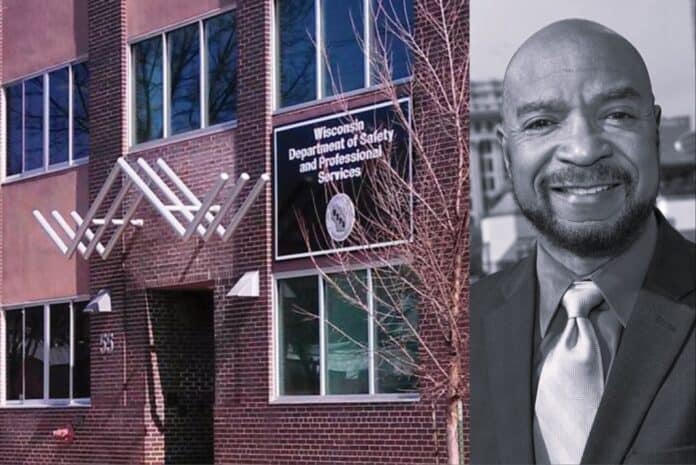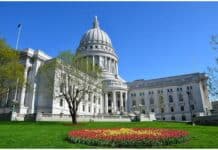Many Americans across the political spectrum believe government simply wastes too much money. As a candidate for statewide office in Wisconsin last year, I certainly heard families’ frustration with the way their hard-earned money is being wasted, particularly in state government. We had good reason to be frustrated then. We have even more reason to be frustrated with waste now.
There are nearly 68,000 staff employed across often overlapping state agencies. What is worse is the fact the Evers Administration increasingly no longer requires the state’s workforce to report physically to work.
COVID-19 Didn’t Start It, But Did Accelerate It
Remember back in 2020 when COVID-19 arrived in Wisconsin, and Governor Evers and his administration sought to shut down much of the economy as well as churches and schools? As part of that effort, the Governor and his cabinet also issued orders reducing the number of employees reporting to work in state office buildings. The administration indicated it was reducing the number of staff reporting to state offices in order to lessen the potential spread of the virus in the workplace.
While Wisconsin courts overturned the Evers Administration’s orders affecting private employers, churches, and schools, relatively few state employees had returned to their offices two years later. In fact, there were so many state office buildings that remained nearly empty, I raised this waste as a campaign issue.
Apparently, the Evers Administration did not take the issue seriously before, during, or after the campaign. Not surprisingly, without strong leadership from the top, the ongoing trend of wasted space…and thus, wasted taxpayer money…has continued.
Legislative Audit Bureau Reports
How do I know? The Wisconsin Legislative Audit Bureau (LAB) just issued a report documenting what I was saying a year earlier…few state employees are working out of state offices.
LAB staff identified nearly 2.5 million square feet of collective office space for 26 state agencies. However, the Bureau’s investigation revealed that the vast majority of that space is simply not being used.
State employees are issued key cards to gain access to assigned workspaces beyond public areas of state office buildings. In a review of data regarding over 3,400 employees assigned to work at four state office buildings, LAB staff found employees used their key cards an average of only 1.3 days per week between January 1, 2023 and June 2, 2023. Based on the same data, there were 122 state employees assigned to work at the four state office buildings who never used their key cards a single time during the 22-week period.
LAB did not rely solely on key card usage records. The Bureau’s staff also physically visited office spaces for 15 state agencies in four state office buildings during the months of July and August 2023. The Bureau conducted agency office space site visits once on Mondays and Fridays and twice on Tuesdays, Wednesdays, and Thursdays for a total of six visits to each of the 15 state agencies.
The Office of Commissioner of Insurance had the highest utilization with 34.5% of its workstations being used. Nearly 72% of all workstations were unused at offices for the Department of Safety and Professional Services, an agency that has been plagued with backlogs in approving licensure for Wisconsin’s workforce. Over 75% of workstations at the Department of Corrections headquarters were not in use. Just 5.3% of all workstations were used at the Department of Public Instruction. In the case of the Wisconsin Higher Educational Aids Board, zero of its workstations were found to be used.
Think Twice Before Visiting State Office Buildings on Mondays & Fridays
You might not want to visit state government on a Monday or a Friday. According to LAB’s analysis based on site visits in July and August, just 10% of workstations were occupied by a state employee on Mondays, and only 16% of workstations were filled on Fridays.
Some state employees do have telework agreements allowing them to work remotely. However, LAB learned that agencies have largely not tracked whether employees with these agreements are showing up to the office as often as reflected in the telework agreement.
Creating Jobs for Non-Residents & Reimbursing Travel to Work
The vast majority of State of Wisconsin employees actually live…well, in the state of Wisconsin. LAB’s report did reveal, however, there are 26 State of Wisconsin employees who not only do not live in Wisconsin, they do not live in a state contiguous to Wisconsin.
While state statutes prohibit state employees from receiving reimbursement for traveling from their homes to their assigned workplace, that did not stop agencies from doing so. In a few instances, the Bureau found employees claimed, and were paid, thousands of dollars in travel reimbursements for reporting to their assigned office.
What Needs to Happen?
For every day the Evers Administration waits to address this problem, taxpayers are forced to cover the cost of nearly empty state-owned and state-leased properties, including paying for associated maintenance, utilities, and insurance. Faced with these statistics, the private sector already would have made substantial changes, or gone out of business.
Governor Evers and his team should:
- Require the vast majority of the state’s workforce to return to their assigned state offices
- Conduct a review of state-owned office buildings, and determine how many of them can be sold within the next 12-18 months to the private sector and returned to the tax rolls
- Review all state-leased properties, and decide which leases can be terminated within the next 12-18 months. (By the way, state operating costs can be significantly lower leasing, rather than owning, office space. The Administration should take that into account.)
In this season, all I want for Christmas is for less of Wisconsin taxpayers’ money to be wasted.
Table of Contents





















![Things My Father Taught Me [Up Against the Wall]](https://www.wisconsinrightnow.com/wp-content/uploads/2025/05/MixCollage-22-May-2025-06-14-PM-4011-1-218x150.jpg)